wilderness
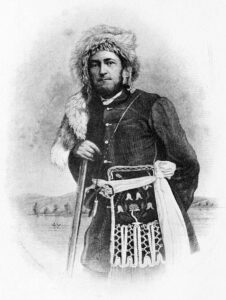 Joe Meek was born in Virginia in 1810. He was a friendly young man, with a great sense of humor, but he had too much rambunctious energy to do well in school. He just couldn’t sit still well enough to focus on his studies. Finally, at 16 years old and illiterate, Meek gave up on school and moved west to join two of his brothers in Missouri. Still, he didn’t give up on all of his learning, just the formal learning. In later years, he taught himself to read and write, but his spelling and grammar remained “highly original” throughout his life.
Joe Meek was born in Virginia in 1810. He was a friendly young man, with a great sense of humor, but he had too much rambunctious energy to do well in school. He just couldn’t sit still well enough to focus on his studies. Finally, at 16 years old and illiterate, Meek gave up on school and moved west to join two of his brothers in Missouri. Still, he didn’t give up on all of his learning, just the formal learning. In later years, he taught himself to read and write, but his spelling and grammar remained “highly original” throughout his life.
Meek seemed to flourish in the West. It appears that he had found his calling, and in early 1829, he joined William Sublette’s ambitious expedition to begin fur trading in the Far West. Meek traveled throughout the West for the next decade. For him there was nothing greater than the adventure and independence of the mountain man life. Meek, the picture of a mountain man, at 6 feet 2 inches tall, and heavily bearded became a favorite character at the annual mountain-men rendezvous. The others loved to listen to his humorous and often exaggerated stories of his wilderness adventures. The truth is, I’m sure many people would have loved to hear about the adventures of the mountain man, especially this one, who was so unique. Like most mountain men, Meek was a renowned grizzly bear hunter. I suppose his stories of his hunting escapades could have been exaggerations, it’s hard to say. Meek claimed he liked to “count coup” on the dangerous animals before killing them, a variation on a Native American practice in which they shamed a live human enemy by tapping them with a long stick. To tap a grizzly bear with a stick, before the attempted kill, took either courage…or stupidity. Meek also claimed that he had wrestled an attacking grizzly with his bare hands before finally sinking a tomahawk into its brain. I suppose that if a grizzly bear attacked you, you would have no choice but to fight for your life, with your bare hands. Having the forethought to go for your tomahawk would be…well, amazing. Most people would try to cover their heads, and hope for the best. Still, that wouldn’t do much good. In a bear attack, you had better fight with everything you have, if you want to live. Maybe 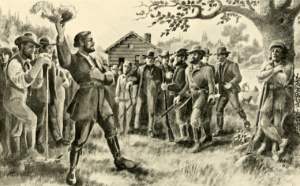 mountain men spent a lot of time considering the possibility of an attack, and practicing in their head exactly how they would handle it.
mountain men spent a lot of time considering the possibility of an attack, and practicing in their head exactly how they would handle it.
Meek soon established good relations with many Native Americans, effectively melding with the Indians. He even married three Native American women, including the daughter of a Nez Perce chief. Now, that didn’t mean that he didn’t fight with the tribes on occasion, or at least the tribes who were hostile to the incursion of the mountain men into their territories. Meek intended to fight for his right to be on the land, the same as the Indians. In the spring of 1837, Meek was nearly killed by a Blackfeet warrior who was taking aim with his bow while Meek tried to reload his Hawken rifle. In the end, the warrior nervously dropped his first arrow while drawing the bow, and Meek had time to reload and shoot. The warrior’s fumble cost him his life, while saving Meek’s life.
After a great run as a mountain man, Meek recognized that the golden era of the free trappers was coming to a close. He began making plans to find another form of income. He joined with another mountain man, and along with his third wife, he guided one of the first wagon trains to cross the Rockies on the Oregon Trail. Once he arrived in Oregon, Meek fell in love with the lush Willamette Valley of western Oregon. He settled down and became a farmer, and actively encouraged other Americans to join him. Of course, more White men on what had been Indian lands, came with safety issued. Meek led a delegation to Washington DC to ask for military protection from Native American attacks and territorial status for Oregon in 1847. Though he arrived “ragged, 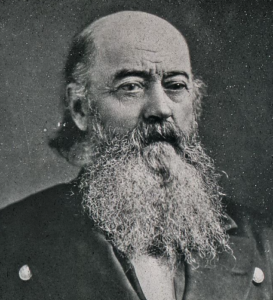 dirty, and lousy,” Meek became a bit of a celebrity in the capitol. Not used to the ways of mountain men, the Easterners truly enjoyed the rowdy good humor Meek showed in proclaiming himself the “envoy extraordinary and minister plenipotentiary from the Republic of Oregon to the Court of the United States.” His enthusiasm prompted Congress to making Oregon an official American territory and Meek a US marshal. I wonder if he was shocked by his new role.
dirty, and lousy,” Meek became a bit of a celebrity in the capitol. Not used to the ways of mountain men, the Easterners truly enjoyed the rowdy good humor Meek showed in proclaiming himself the “envoy extraordinary and minister plenipotentiary from the Republic of Oregon to the Court of the United States.” His enthusiasm prompted Congress to making Oregon an official American territory and Meek a US marshal. I wonder if he was shocked by his new role.
He might have been shocked, but Meek embraced his new role. He returned to Oregon and became heavily involved in politics, eventually founded the Oregon Republican Party. After his years of service, he retired to his farm, and on June 20, 1875, at the age of 65, Meek passed away. With his passing the world lost a skilled practitioner of the frontier art of the tall tale. It is said that his life was nearly as adventurous as his stories claimed, but there is no sure line to tell what was real and what was tall tale.
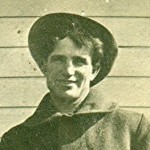
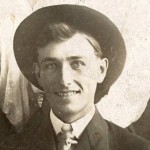 Animal skins were used for clothing and blankets for centuries. People didn’t have other options in ancient times. The fur trade continued into the Old West, and it’s history is filled with stories of adventure, daring, and savage warfare. It is said that being a trapper took a man of strong constitution. It wasn’t a job for sissies. The trappers suffered isolation in the wilderness, and battled constantly against wild beasts and wild men. Many trappers didn’t survive it, and in fact, the majority died in the silence of remote regions.
Animal skins were used for clothing and blankets for centuries. People didn’t have other options in ancient times. The fur trade continued into the Old West, and it’s history is filled with stories of adventure, daring, and savage warfare. It is said that being a trapper took a man of strong constitution. It wasn’t a job for sissies. The trappers suffered isolation in the wilderness, and battled constantly against wild beasts and wild men. Many trappers didn’t survive it, and in fact, the majority died in the silence of remote regions.
One of those men was my grandfather, Allen Luther Spencer. Grandpa, along with his brother-in-law, my Uncle Albert Schumacher decided to become trappers. Northern Minnesota was filled with animals that were perfect for trapping, and they had decided to make their fortune. It was a noble decision, but they really had no idea just how tough it would be. This was not a job for the casual trapper. Most trappings occurred in the great mountains. Here, the trappers spent the larger part of their lives. I don’t think my grandpa and my uncle really had any intention of living their lives in the isolated wilderness. They just wanted to make a living.
They trapped for a time, and really they didn’t do too bad, when it came to trapping, but I don’t think they were prepared for the cold and isolation. Northern Minnesota is one of the coldest places on earth. That would prove to be their undoing. Camping out in a tent in the winter in northern Minnesota…well, it was kind of crazy. I guess in that way, so were they. After a while, they realized just how crazy it was. While they had modest success at fur trapping, they decided that it wasn’t really worth it in the end. I can understand that. If it were just the cold, it might be one thing, but there were the wild animals too. Bears, mountain lions, wolves, just to name a few, while prime furs, are still a force to be contended with. When you pit man against beast, all too often, the beast comes out on top, Of the many trappers in the old west, many went out to trap, and never 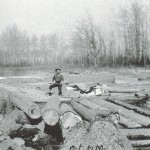
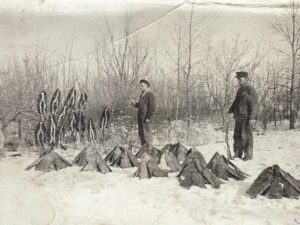 returned…not only never returned, but were never heard from again. I’m glad that was not the fate of my grandpa and my uncle.
returned…not only never returned, but were never heard from again. I’m glad that was not the fate of my grandpa and my uncle.
So, since they were already in the woods in northern Minnesota, and it was an area known for its lumber trade, they decided to abandon the fur trapping business, and go into the lumber business. That turned out to be a far better decision. Not only could they make a decent living, but they were able to sleep in a warm bed at night.
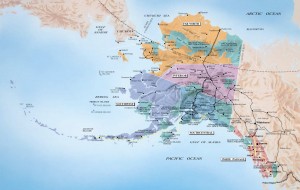 Until recently, I had never given much thought to historic events concerning Alaska. It wasn’t that I wasn’t interested, but rather that other places occupied my mind. Nevertheless, with the recent trip Bob and I took, Alaska has found a place in my mind and heart. Does that mean I have the Alaska Bug…well maybe, because if you offered me a free trip, I would be there with bells on. That said, I noticed the fact that today is a hugely significant day in Alaska’s history. Alaska became a state on December 7, 1959, the 50th state, Hawaii joined the union on August 21, 1959. It is very strange to think that it took almost 172 years to acquire all 50 states, and the final two joined within my lifetime. In our minds, we rather expect that all the states would have been within the first hundred years of each other, but such was not the case at all. Nevertheless, all but two states were within the first 125 years, with only the last two joining 47 years later.
Until recently, I had never given much thought to historic events concerning Alaska. It wasn’t that I wasn’t interested, but rather that other places occupied my mind. Nevertheless, with the recent trip Bob and I took, Alaska has found a place in my mind and heart. Does that mean I have the Alaska Bug…well maybe, because if you offered me a free trip, I would be there with bells on. That said, I noticed the fact that today is a hugely significant day in Alaska’s history. Alaska became a state on December 7, 1959, the 50th state, Hawaii joined the union on August 21, 1959. It is very strange to think that it took almost 172 years to acquire all 50 states, and the final two joined within my lifetime. In our minds, we rather expect that all the states would have been within the first hundred years of each other, but such was not the case at all. Nevertheless, all but two states were within the first 125 years, with only the last two joining 47 years later.
Alaska was first discovered in 1741 when a Russian expedition led by a Danish navigator named Vitus Bering sighted the Alaskan mainland. Before long Russian hunters were making trips into Alaska, and their presence wreaked havoc on the Aleutian people, who had been relatively disease free prior to their exposure to foreign diseases. The first permanent Russian colony in Alaska was established on Kodiak Island in 1784 by Grigory Sheliknov. Settlements spread across the west coast of North America during the 19th century, with the southernmost fort located near Bodega Bay in California. By the 1820’s, the Russians were spending less and less time in the new world, and the British and Americans were allowed to trade in Alaska…after a few diplomatic conflicts. By the 1860s, Russia was nearly bankrupt, and so they decided to offer Alaska for sale to the United States, because they had expressed an interest earlier. The purchase took place on March 30, 1867 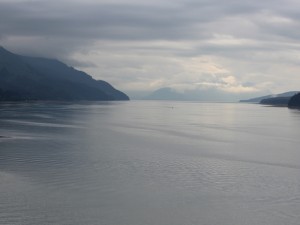 when Secretary of State William H Seward…I wondered where some of the names came from…signed the agreement and the United States purchased Alaska for 7.2 million…which was about two cents an acre…quite a deal really. Nevertheless, the purchase was ridiculed by Congress and the place was called “Seward’s Folly”, “Seward’s Icebox”, and President Andrew Johnson’s “polar bear garden” for some time. Still, the Senate ratified the purchase of this vast land that measured one fifth of the size of the continental United States.
when Secretary of State William H Seward…I wondered where some of the names came from…signed the agreement and the United States purchased Alaska for 7.2 million…which was about two cents an acre…quite a deal really. Nevertheless, the purchase was ridiculed by Congress and the place was called “Seward’s Folly”, “Seward’s Icebox”, and President Andrew Johnson’s “polar bear garden” for some time. Still, the Senate ratified the purchase of this vast land that measured one fifth of the size of the continental United States.
Settlement of the new territory was very slow. It seemed that people didn’t feel comfortable about this cold, desolate wilderness, where the sun didn’t act like it did in the rest of their world. Nevertheless, all their apprehension was quickly forgotten with the discovery of gold in 1898. People moved to Alaska in droves to try to make their fortune. In my travels to Alaska, I had the opportunity to watch a movie about the Klondike Gold Rush. While people did find gold, it came at a heavy price, and many people paid the ultimate price. This land was an unforgiving place. Those who were not prepared for it’s harshness, soon found out what it took to live there, and not everyone could do so. It didn’t make them less manly, it just wasn’t for everyone…gold or no gold.
Still, those people who came to Alaska and felt an instant connection, knew in their hearts that this harsh, vast wilderness had somehow gotten into their blood. That is how Alaskans feel about their state to this day. Not everyone is cut out for it, and they do have a tendency to laugh and joke a bit about the light weights who go home, but they also understand that the ones who stay are a bit of a rare breed. In years gone by, we would have called them Mountain Men, and I suppose that fits the early Alaskan people, but by the same token, they would not have made it either, had it not been for the wisdom of the Aleutian people concerning their health. There weren’t all kinds of things like antibiotics, and immune system boosters then. And fruits and such were not plentiful either. But the Aleutian people knew of ways to get vitamin C and other things to prevent disease. 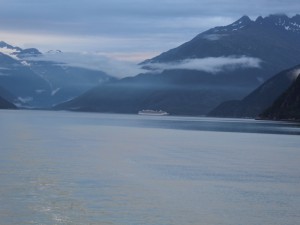 Even so, at that time, people did not stay permanently in Alaska. They summered there. Many people still do. They just don’t like the winters there. And yet, if you look, there are areas of Alaska…along the coast, like Anchorage that is actually warmer than places like Chicago. Of course, the interior just doesn’t fall into the warm category, with temperatures reported as low as -65° is some places. I think I might want to get out of there for the winter too. Nevertheless, Alaska is an amazing state, and one that I would love to visit again. Not only is it big in size, but everything there seems huge. The mountains are amazing, and the glaciers awe inspiring. If you ever get the chance to visit our 49th state, it is a trip you will never forget…believe me.
Even so, at that time, people did not stay permanently in Alaska. They summered there. Many people still do. They just don’t like the winters there. And yet, if you look, there are areas of Alaska…along the coast, like Anchorage that is actually warmer than places like Chicago. Of course, the interior just doesn’t fall into the warm category, with temperatures reported as low as -65° is some places. I think I might want to get out of there for the winter too. Nevertheless, Alaska is an amazing state, and one that I would love to visit again. Not only is it big in size, but everything there seems huge. The mountains are amazing, and the glaciers awe inspiring. If you ever get the chance to visit our 49th state, it is a trip you will never forget…believe me.
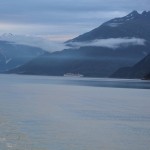 As a kid, I heard the song, North to Alaska often. My parents were fascinated with the idea of going to visit there. Dad talked about it so much, that when it came time for their 50th Wedding Anniversary, our gift to them was a simple choice…a cruise to Alaska. They had such a wonderful time, and it was a memory that has lived on. Then a couple of years ago, I started thinking about how great it would be to see Alaska for myself. Everyone talked about how big Alaska was, and as a state, it is…very big, but that is not really what makes Alaska big…as I found out.
As a kid, I heard the song, North to Alaska often. My parents were fascinated with the idea of going to visit there. Dad talked about it so much, that when it came time for their 50th Wedding Anniversary, our gift to them was a simple choice…a cruise to Alaska. They had such a wonderful time, and it was a memory that has lived on. Then a couple of years ago, I started thinking about how great it would be to see Alaska for myself. Everyone talked about how big Alaska was, and as a state, it is…very big, but that is not really what makes Alaska big…as I found out.
There is a quality about Alaska that can’t be described any other way, but big…a vastness that you can actually feel. That was part of the draw for my parents, and then for me. I felt like the pioneers or gold rushers, setting out into the unknown. Yes, it was quite different for me than it was for them, because so many had traveled before me, and the route is known. There are guides all the way. Still, you get a feeling of being in the wilderness, in the last frontier. Alaska truly is just that, the last 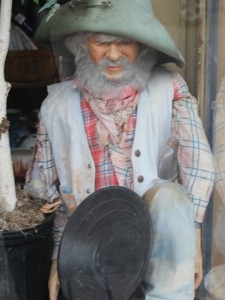 frontier, and yet, how could that still be when it has been a state for 55 years? I suppose that it is because much of Alaska hasn’t changed in all those years. About 94% of the state is still uninhabited…at least by permanent residents. Just knowing that makes Alaska have an air of mystery…of wildness.
frontier, and yet, how could that still be when it has been a state for 55 years? I suppose that it is because much of Alaska hasn’t changed in all those years. About 94% of the state is still uninhabited…at least by permanent residents. Just knowing that makes Alaska have an air of mystery…of wildness.
While in Alaska, I found myself wondering what the gold rush was like. We watched a movie at the visitors center in Anchorage, about the Klondike Gold Rush, and I realized that not only were lives lost in the search for wealth, but lives were destroyed. People lost everything they had…betting on the possibility of striking it rich. Around 100,000 men set out on the journey to the Klondike region in northwestern Canada, most of them by way of Skagway, White Pass, and the Yukon River, where they sailed to the Klondike, but only about 30,000 to 40,000 made it. The rest gave up, or died. Alaska is a place that is very unforgiving. The mountains are very high and topped with glaciers. It was cold and filled with steep climbs. Citrus fruit was scarce, so Scurvy was common. It was a really miserable place to be in winter, and yet they came.
There is still something about Alaska that draws people to it. Yes, there is still gold in Alaska, 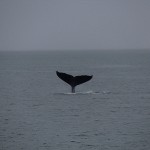 but there is much more to it than that. There is something about its vast wilderness that challenges them…keeps them there or keeps them coming back. Maybe it’s the beauty of the whole place, or the mountains rising sharply right out of the water,…that are able to dwarf a cruise ship, or any other vessel. It could be the hunting and fishing, or maybe the whale watching. It could be any or all of those things, but for me it was a combination of several of these, coupled with a desire to see the things my parents had seen on their trip. So far, Bob and I are the only ones in the family to go to Alaska, besides Mom and Dad, but if I’m not mistaken, more will follow. Alaska has a way of calling your name…drawing you north.
but there is much more to it than that. There is something about its vast wilderness that challenges them…keeps them there or keeps them coming back. Maybe it’s the beauty of the whole place, or the mountains rising sharply right out of the water,…that are able to dwarf a cruise ship, or any other vessel. It could be the hunting and fishing, or maybe the whale watching. It could be any or all of those things, but for me it was a combination of several of these, coupled with a desire to see the things my parents had seen on their trip. So far, Bob and I are the only ones in the family to go to Alaska, besides Mom and Dad, but if I’m not mistaken, more will follow. Alaska has a way of calling your name…drawing you north.
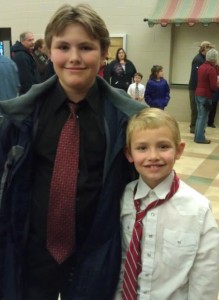 Easton is like most little boys. He hates the whole dressing up thing that many parents are always wanting their kids to do. In fact, if he could figure out a way to get out of ever dressing up, he would do it. I think most men would have a tendency to agree with Easton…especially when it comes to wearing a tie. They just hate that tie. It chokes them, and if they are at all claustrophobic, it can make them feel like the walls are closing in. And for a little boy, it is even worse. I suppose it could be likened to sitting in a corner, or time out. In fact, time out probably says it all, because just as soon as they dare, little boys are asking, “Can I please take this tie off??” That is, if they ask to take it off at all.
Easton is like most little boys. He hates the whole dressing up thing that many parents are always wanting their kids to do. In fact, if he could figure out a way to get out of ever dressing up, he would do it. I think most men would have a tendency to agree with Easton…especially when it comes to wearing a tie. They just hate that tie. It chokes them, and if they are at all claustrophobic, it can make them feel like the walls are closing in. And for a little boy, it is even worse. I suppose it could be likened to sitting in a corner, or time out. In fact, time out probably says it all, because just as soon as they dare, little boys are asking, “Can I please take this tie off??” That is, if they ask to take it off at all.
Easton had finally had enough, and so he untucked his shirt and loosened his tie. He hoped that his mom wouldn’t notice, and in the end, his hopes were realized. His mom, my niece, Machelle took the picture without even noticing the tie was loosened and the shirt untucked. It was Easton’s Aunt Susan who would notice the sneaky maneuver her nephew had pulled off. By that time, there was nothing left to do but laugh at the fact the Easton had won…that battle anyway.
Now, if you were to put Easton, and most other little boys, in a different situation, you would find that they are totally comfortable. That situation would be, of course, camping. There is nothing better, in the mind of a little boy, than the adventures you can 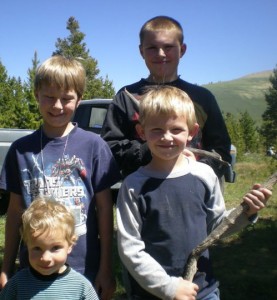 have while camping in the wilderness. All sorts of things can happen out there, and everyone will need a hero to save them from whatever danger might lurk just outside of the eye view of the camp. There could be wolves, bears, snakes, and many other such wild animals, but their moms can relax, because these boys will save them from that. They are big tough campers, and everyone knows that any self respecting wolf or bear, or even snake, would run from them. And that is the main reason why moms must understand that real boys, hate that tie. They are simply too macho for their tie!!
have while camping in the wilderness. All sorts of things can happen out there, and everyone will need a hero to save them from whatever danger might lurk just outside of the eye view of the camp. There could be wolves, bears, snakes, and many other such wild animals, but their moms can relax, because these boys will save them from that. They are big tough campers, and everyone knows that any self respecting wolf or bear, or even snake, would run from them. And that is the main reason why moms must understand that real boys, hate that tie. They are simply too macho for their tie!!
Today is Easton’s 9th birthday. Easton, I hope you don’t have to wear that horrible tie!! I mean, really Machelle, get a clue!! Real boys are too macho for a tie!! Happy birthday Easton!! Have a great, tieless day!! We love you!!

